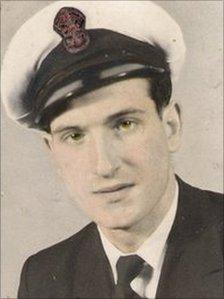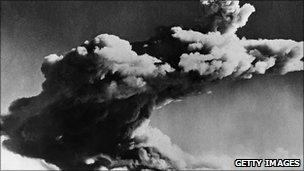Veterans' long battle for nuclear tests' compensation
- Published

Douglas Hern is among those whose claims were rejected.
The Court of Appeal's decision to deny ex-servicemen compensation for the injuries they say they suffered during Cold War nuclear tests more than 50 years ago, is a setback for the thousands who were watching the test cases anxiously.
More than 1,000 ex-servicemen say their lives were destroyed after the UK carried out a series of nuclear weapons tests in mainland Australia, the Montebello islands off the west Australian coast and on Christmas Island, in the Pacific, between 1952 and 1958.
The six nuclear tests were carried out against a backdrop of decolonisation and the growing threat of the , with the UK desperate to establish and show herself as a nuclear power.
White, brilliant light
Veterans who served in the Army, Royal Navy and Air Force - as well as personnel from New Zealand and Fiji - were all exposed to radiation.
Last year Dougie Hern, from Spalding, Lincs, told the BBC that he was just a 21-year-old naval cook when he was caught up in an explosion.
"We saw a bright, brilliant light," he recalled.
"It was as if someone had switched a firebar on in your head. It grew brighter and you could see the bones in your hands, like pink X-rays, in front of your closed eyes."
He said after the mushroom cloud had exploded, those on the islands were told to dust themselves down and return to work.
But Mr Hern, now 73, believes radiation exposure on that day and four others is the cause of his diabetes, the spurs growing on his sternum and the death of his 13-year-old daughter from cancer.
He was among those at the London court on Monday whose cases were rejected.
Radiation exposure
The veterans have been battling for recompense and a recognition of their claim that their poor health was caused by radiation exposure.
Other chronic health problems reported by the veterans include cancers, skin defects and fertility problems.
But the MoD has always denied their claims of negligence.
The Court of Appeal, which on Monday said it had seen no evidence to show the tests were the only causes of the men's illnesses, referred to previous cases.
Lady Justice Smith told the court that in 1985 war veteran Melvyn Pearce won a significant victory in the House of Lords when it was established the MoD could not rely on Crown immunity to stop it from being sued.
But he was forced to abandon his claim as his advisers realised they could not prove radiation exposure was the root cause of his cancer - this, she said, was a warning that causation was a difficult and important issue to address.
Twice as many cancers
In 1998, research from Durham University suggested that one in three servicemen died from bone cancers or leukaemia linked to the atomic and hydrogen bomb tests.
It was widely reported that Sue Rabbit-Roff, a researcher at Durham University, had contacted 2,500 veterans in Britain and New Zealand and established that twice as many of them were suffering from multiple myeloma, a radiogenic cancer, than had been admitted by successive British governments.
Veterans bringing their case in the UK were also buoyed by the way similar cases have been dealt with elsewhere.
The US has awarded compensation under the Radiation Exposure Compensation Act to veterans, including at least one Briton, involved in nuclear testing in the 1960s.
Roy Prescott, of Burton-upon-Trent, Staffordshire, was given £40,000 in 2006.
Last month, the US government gave Pat Spackman $75,000 (£47,000) compensation after her husband, former RAF navigator Derek, died from throat cancer.
He was stationed in Darwin in 1954 and was sent on missions to test radioactivity following US nuclear tests around the Marshall Islands.
The MoD had refused to give Mrs Spackman a war widow's pension.
In France last year, the government agreed to compensate those who contracted illnesses attributed to the country's nuclear tests in the Sahara and French Polynesia between 1960 and 1996.

The first British nuclear bomb was set off in the Archipelago of Montebello on 3 October 1952
But British veterans Ken McGinley from Renfrewshire and Edward Egan from Glasgow were twice defeated when they applied to the European Court of Human Rights to find out if the government of the day had violated their human rights.
However, in June last year, the High Court gave the current group of veterans the right to sue the Ministry of Defence.
In his judgement, Mr Justice Foskett said all the veterans were "entitled to a day in court".
He did acknowledge, though, that many of those who could have provided witness statements for the MoD about the planning and execution of the tests had either died or were untraceable.
This time the appeal judges said the nine test cases were launched outside the legal time limit and so stopped them from proceeding.
But the latest judgement is far from the end of the matter.
The Court of Appeal judges have agreed that the case of one veteran - the late Bert Sinfield - could proceed to trial, while the the others are expected to try to take their case to the Supreme Court.
- Published22 November 2010